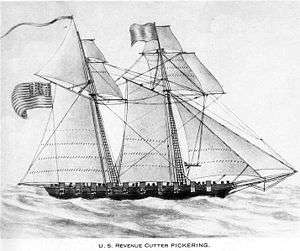USS Pickering (1798)
 USRC Pickering, later renamed USS Pickering | |
| History | |
|---|---|
| Name: | USS Pickering |
| Laid down: | 1798 |
| Commissioned: | 22 August 1798 |
| Fate: | Lost at sea, September 1800-possibly in a gale |
| General characteristics | |
| Type: | Topsail schooner |
| Displacement: | 187 long tons (190 t) |
| Length: | 77 ft (23 m) |
| Beam: | 20 ft (6.1 m) |
| Draft: | 9 ft (2.7 m) |
| Propulsion: | Sails |
| Complement: | 70 officers and enlisted |
| Armament: | 14 × 4-pounder guns |
The USS Pickering was a topsail schooner in the United States Navy during the Quasi-War with France. She was named for Timothy Pickering, then the Secretary of State.
The USRC Pickering was built at Newburyport, Massachusetts in 1798 for the Revenue Cutter Service. Captain Jonathan Chapman was her first commander. Taken into the Navy in July at the outbreak of the Quasi-War, she departed Boston on her first cruise on 22 August.
Service history
In 1799 and early 1800, she was part of Commodore Barry's squadron in the West Indies. Lieutenant Edward Preble commanded thePickering from January through June 1799, when he was promoted to captain and took command of the frigate Essex.
The Pickering was permanently transferred to the Navy on 20 May and redesignated the USS Pickering. Master Commandant Benjamin Hillar, U.S. Navy, assumed command in June. Under Hillar's command the Pickering fought a notable engagement with the French privateer L'Egypte Conquise on October 18, 1799. The Frenchman was well fitted out and manned and should have been able to capture the Pickering. While the French ship carried fourteen 9-pounders, four 6-pounders, and crew of 250, the American cutter had only fourteen 4-pounders and seventy men. After a nine-hour battle, however, the French ship was forced to surrendered. The USS Pickering continued to cruise in the West Indies, and before her return to the United States had captured four French privateers, including the Voltigeuse, Atalanta, L'Active and Fly and recaptured the American merchant ship Portland.
The Pickering departed from Boston on 10 June 1800. Ordered to join Commodore Thomas Truxton's squadron on the Guadeloupe Station in the West Indies, she sailed from Newcastle, Delaware on 20 August, and was never heard from again. She is presumed to have been lost with all hands in a gale in September, but this was never proven. This storm is also thought to have sunk the USS Insurgent, which vanished without a trace. The exact cause of the cutter's disappearance remains a mystery.
References
This article incorporates text from the public domain Dictionary of American Naval Fighting Ships. The entry can be found here.